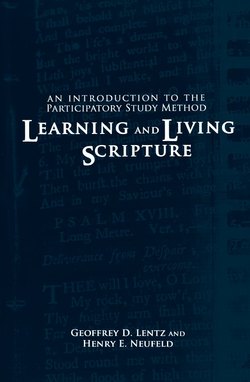Читать книгу Learning and Living Scripture - Geoffrey D Lentz - Страница 8
На сайте Литреса книга снята с продажи.
Principles Behind the Method
ОглавлениеThe Spirit will teach you everything. – John 14:26 (CEV)
The people of Berea were much nicer than those in Thessalonica, and they gladly accepted the message. Day after day they studied the Scriptures to see if these things were true. – Acts 17:11 (CEV)
A new Bible student quoted John 14:26 to me when she was about to quit my class in basic Bible study. “I don’t have any problem with what you are teaching,” she said, “but I think the Holy Spirit can teach me all that.” Perhaps she needed to follow up by reading about the Bereans in Acts 17!
While I believe that the Holy Spirit is the best teacher, I still believe that this girl needed some of the material in my class. The Holy Spirit tends to teach us through many means; teachers, preachers, prophets, speaking to us directly, taking us through some difficult times of study, and the use of our God-given minds.
The participatory method of Bible study is designed to bring all these different factors together. It asks you to get yourself involved in the experience that the Bible represents, to look for the ways in which the material can apply to you. You don’t have to accept everything to use this method, but you do have to be willing to be as empathetic as possible with the characters of the Bible story, and the writers of the Bible books. You have to be willing to try to understand things from their perspective.
If you believe further, as we do, that God is speaking through these experiences and writings, then you will want to go further. After you have understood the principles on which they were basing their lives, you will want to find out what principles God was trying to teach, and then how you can apply those principles directly in your own life, and in the life of your community. If you do that, you can be involved in building the body of Christ in a new and ever growing way.
The Bible presents these principles in ways that may seem strange to you. Sometimes they are contained in rituals. Sometimes they are contained in stories. At other times they may be hidden in allegories or in symbolic visions. Each of these methods communicated some part of God’s message to someone. The hidden pearls of God’s truths are within a matrix of another person’s times, problems, and assumptions – you could say in their entire culture. What we try to do is get at the principles and find a way to apply them in our time and culture.
In order to do this, there are some key questions. These questions will be repeated in the chapters on interpreting particular types of literature, because while the interpretive method changes, the final result will often remain the same.
What is the experience behind this passage?
How might the experience reflected in this passage relate to my own experience?
What principle(s) lies behind the specific statements?
How might the principles relate to my life?
In order to answer these questions, we have to come to understand the Bible writers, their time and culture as much as possible. Fortunately, we have a great deal of material available right in the Bible to help us do that. We can then find out why they did particular things, and learn how to use those principles constructively. It is quite possible for a Bible student to make decisions based on the mistakes of some Bible characters or writers. The Bible records their mistakes, often in some detail. But when you understand the passage, why it is there, and what principles it conveys, then you can make use of it in a practical and helpful way.
There is no shortcut in Bible study. If you want to find what God has for you in scripture, you will have to dig. There are some things you can do to make your study time more profitable. The participatory method is not going to be easier than other methods of inductive Bible study. It is our aim, however, that it be more practical, with the focus always on learning how we can become better disciples of Jesus.
